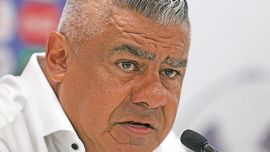Argentina is now reporting over 5,000 coronavirus cases a day, mainly in the Buenos Aires metropolitan area (AMBA, consisting of Buenos Aires City plus Greater Buenos Aires). City health authorities have warned that the population must brace for the fiercest weeks of the epidemic yet. The number of cases is growing just as authorities have eased the lockdown, which has been in place with varying levels of restrictions in some form or another since March 20. The disease is crippling the economy, even when Argentina still compares well with neighbours Brazil and Chile. The rift is now between those who blame the lockdown championed by President Alberto Fernández, a centre-left Peronist, and those who say the pandemic itself is responsible for the harsh economic times that lie ahead.
It's not an argument that has divided the people in charge. City Mayor Horacio Rodríguez Larreta, a prominent leader of the opposition Juntos por el Cambio coalition, has backed the policies he has agreed on in regular meetings with the national government. Most of the centre-right opposition’s leaders who are in office are refraining from rubbishing lockdown policies. The president's popularity has dropped, but it is still relatively high. One centre-right mayor from Greater Buenos Aires on Thursday blasted fellow opposition coalition leaders currently not in office for stoking controversy over the pandemic.
Both the ruling Peronist front, which includes a vocal militant Kirchnerite wing, and the opposition coalition, at times look on the verge of splintering. There’s growing speculation that the president will soon be forced to reshuffle his Cabinet amid hushed complaints about inaction. Fernández’s approach seems to be that the pandemic and the renegotiation of US$65 billion dollars worth of foreign debt must be tackled first before the government can introduce more long-term policies. But the critics can't wait and even some members of the ruling coalition are trying to prod the president into doing something about allegations that the Cabinet is sluggish. Fernández has since announced that he will submit his ambitious reform of the justice system to Congress in a bid to get things moving, yet other drafts sponsored by the government, including a wealth tax bill, have not moved an inch since being announced.
Even the debt restructuring, which initially had a deadline in April, has dragged on mercilessly. It is still unresolved. Economy Minister Martin Guzmán, a young US-trained academic drafted for his debt expertise, has made four offers to the bondholders who still have the option of legal action against the republic in US courts if they don't agree terms. Three main groups of bondholders have rejected the latest improved offer (of 53 cents on the dollar). The national government is not budging ahead of the August 4 deadline. Both Fernández and Guzmán have said any further improvement of the offer would mean subjecting Argentina to an unacceptable degree of austerity. The president addressed these issues in an interview with the Financial Times this week – he admitted that he does not like “economic plans,” effectively sending out the message that he does not favour committing to the kind of belt-tightening policies demanded by the bondholders as reassurance that they will be paid. By shunning “plans” Fernández is emulating his former boss when he was Cabinet chief, Néstor Kirchner. The late former president (2003-2007) preferred to deal with issues as they came along without committing to a plan that could be easily derided, though he rarely said so in public. Now Fernández is openly showing his hand to the international press – “There is not going to be another offer,” he declared. The president's spin is that Argentina already defaulted under his pro-business predecessor Mauricio Macri and that the new Peronist administration is trying to put things right financially by reaching an agreement with the bondholders. A deal seems to be close, with the main groups of bondholders having made a counter-offer, but those billions of dollars are still up in the air.
Nightmare scenario
The nightmare scenario this winter would be the collapse of the health system, which is currently holding up despite fears, and no debt agreement. The agitation is latent – protestors took to the streets defying the lockdown on Independence Day (July 9) accusing the national government of using the virus as an excuse to further regulate the economy and curtail civil liberties. That same day, Fernández delivered a speech flanked by top business leaders, the head of the Sociedad Rural Argentina (historically at odds with Kirchnerismo), and the boss of the CGT confederation of trade unions. Eyebrows were raised when Vice-President Cristina Fernández de Kirchner highlighted a Pagina/12 article on Twitter which argued that there was no point in trying to convince Argentina's “conservative” business leaders that they should embrace economic policies of “national development” because they will never yield and truly support them. Fernández de Kirchner also expressed her support for Guzmán on Twitter, at a time there is speculation that the minister could eventually be replaced by a more market-friendly economist.
Some Frente de Todos officials have described all this as “healthy debating” within the ruling coalition (the national and Buenos Aires province security officials are also prone to constant arguing). The internal debate includes the political situation in Venezuela, which could be significant for the debt restructuring talks because the US government is watching regional developments closely. Argentina last week expressed concern about the human rights situation at the United Nations, but Fernández has refrained from calling Venezuela's socialist ruler, Nicolás Maduro, a dictator and opposes foreign intervention (potentially backed by the US). Yet Lower House Speaker Sergio Massa, a key member of the ruling coalition, has made a point of calling Venezuela's Bolivarian government a “dictatorship.”
Now rewind back to July 9. Business leaders have since held remote talks with the CGT bosses to discuss policies to battle the crisis. It's not clear if these talks, which come at a time of labour unrest, have the president's blessing. The powerful truck drivers' union, which is headed by Hugo Moyano, recently staged a picket at a plant of the e-commerce giant Mercado Libre over the affiliation of workers there. Moyano supports the government but he is not a member of the CGT’s leadership. Other left-leaning unions, grouped under the pro-government CTA umbrella group, were not invited to the July 9 summit and also did not take part in the remote talks between the CGT and some of Argentina's richest and most powerful business leaders. The picketing of the Mercado Libre distribution plant, in the middle of a lockdown when e-commerce sales are rocketing, irked the business community. CGT leader Héctor Daer on Thursday said that arguments over union membership must be settled in court. The unrest comes just weeks after Fernández's recent announcement of a plan to nationalise the debt-saddled soy crusher Vicentin, based in Santa Fe Province, triggered a wave of protests. The president has since frozen the nationalisation while the court handling the company's administration considers an alternative plan tabled by the provincial government.
The pandemic is putting the nation's leaders under pressure. The private sector, already reeling from a long recession and the constant devaluation of the peso before the coronavirus hit, is also in distress. Private power utility firm Edesur is facing fierce criticism from southern Greater Buenos Aires municipalities over widespread power cuts and scant investing. The state-run regulator is facing calls to take the concession away from Edesur, which was allowed to introduce huge rate increases during the administration of Mauricio Macri in 2015-2019. Another issue to get into an argument about.



















Comments